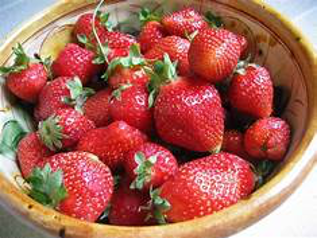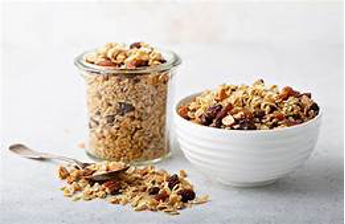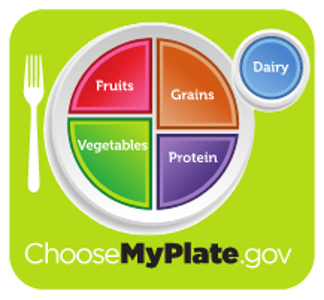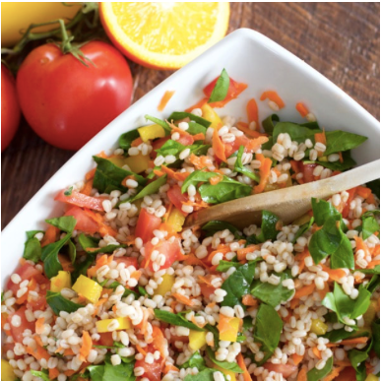 Written by UConn Dietetic Intern Katherine Wojenska
Written by UConn Dietetic Intern Katherine Wojenska
You’re scrolling through Facebook in your spare time and you come across Aunt Linda’s shared post titled, “Want to Lose 20lbs in 7 Days? Just Follow These 10 Steps to A Healthier Lifestyle!”. You click on it and you see many “do this, not that”; “avoid carbs, they will make you fat”; or my favorite “sugar is as addictive as drugs!”. Let’s take a deep breath. These are very common nutrition myths that have been set into our minds for decades.
Let’s break down the 5 common nutrition myths:
1. You need to drink 6- 8 cups of water a day
 We are made up of 75% of water1. Our fluid requirements are based on our age, gender, activity level, overall health, climate we live in, and our body size/ muscle mass. One way to check if you are hydrated is your urine color. If your urine is pale yellow, you’re good! If it is a dark amber or dark yellow, drink up. Did you know you don’t need to drink only water to get hydrated? Your tea, coffee and milk count. And fruits and veggies like watermelon, strawberries, celery, and cooked carrots have high water content and can make up to 20% of your daily water intake. Stay hydrated!
We are made up of 75% of water1. Our fluid requirements are based on our age, gender, activity level, overall health, climate we live in, and our body size/ muscle mass. One way to check if you are hydrated is your urine color. If your urine is pale yellow, you’re good! If it is a dark amber or dark yellow, drink up. Did you know you don’t need to drink only water to get hydrated? Your tea, coffee and milk count. And fruits and veggies like watermelon, strawberries, celery, and cooked carrots have high water content and can make up to 20% of your daily water intake. Stay hydrated!
2. Don’t Eat After 6pm
Our bodies continue to work even after 6pm. When we sleep, our body is  recovering and repairing from what we did throughout the day, which requires energy. Having a bedtime snack can be beneficial and may help you stay asleep at night. A small snack with a combination of complex carbs and protein/ fat may work wonders for you. A great snack example would be whole grain crackers with low-fat cheese or Greek yogurt topped with your favorite fruit.
recovering and repairing from what we did throughout the day, which requires energy. Having a bedtime snack can be beneficial and may help you stay asleep at night. A small snack with a combination of complex carbs and protein/ fat may work wonders for you. A great snack example would be whole grain crackers with low-fat cheese or Greek yogurt topped with your favorite fruit.
3. Lose weight by restricting carbohydrates and fruits
The brain and body prefer carbohydrates as their fuel source.There are two types of carbohydrates, simple and complex. Simple carbs include refined rice and bread that are in fact fortified, so do offer nutrients,  but they digest quite quickly and should be enjoyed in moderation. Complex carbs include canned beans like black or kidney beans, and whole grains like oatmeal and barley which are full of fiber and vitamins. Any food taken in large amounts increases your calorie intake so may lead to weight gain. Blaming one food group is not the answer. A balanced diet means enjoying all types of food in moderation!
but they digest quite quickly and should be enjoyed in moderation. Complex carbs include canned beans like black or kidney beans, and whole grains like oatmeal and barley which are full of fiber and vitamins. Any food taken in large amounts increases your calorie intake so may lead to weight gain. Blaming one food group is not the answer. A balanced diet means enjoying all types of food in moderation!
4. You cannot be overweight and healthy at the same time
BMI (Body mass index) is only one tool to assess health. BMI is a measure of body fat based on height and weight that applies to adult men and women. Behaviors are better indicators of health than weight. A “normal” weight person may have very unhealthy lifestyle habits (poor sleep, sedentary habits, poor nutrition intake) and chronic illness, while an “overweight” person may have good diet habits and often engage in physical activity. Eating a healthy

and balanced diet and moving regularly are two of the keys to a healthy body and overall health for the long term.
5. Low-fat and fat free products are better for you
Check that nutrition label! Products listed as low-fat often have the fat replaced by additional sugar to maintain the flavor. It is best to portion control the high fat foods when the cravings hit. Fat also helps keep us feeling fuller longer because it takes longer to digest. Enjoy in moderation!
So that’s the scoop on some nutrition myths “out there”. Check out this simple and yummy salad!
Veggie Barley Salad Makes: 4 Servings
Ingredients
 1 cup pearl barley
1 cup pearl barley
1 medium tomato, chopped
2 medium carrots, shredded
1 medium red, orange, or yellow bell pepper, seeded and chopped
2 cups fresh spinach, chopped
3 Tbs orange juice, fresh squeezed if possible
3 Tbs oil
2 Tbs apple cider vinegar, or any other mild vinegar
1 tsp honey
¼ tsp salt
¼ tsp ground black pepper
Instructions
- Bring a large pot of water to a boil. Add the barley and cook, uncovered, until tender, about 40 minutes. Transfer to a large bowl.
- Add the tomato, carrots, bell pepper, and spinach and stir to combine.
- In a small bowl, whisk together the orange juice, oil, vinegar, honey, salt, and pepper. Pour the vinaigrette over the barley salad and mix thoroughly. Refrigerate overnight for best results.
Recipe link – https://www.snap4ct.org/veggie-barley-salad.html
This material is funded by UDSA’s Supplemental Nutrition Assistance Program (SNAP).
This institution is an equal opportunity employer.